
Whistler
By Braden Dupuis
If 2016 was about colossal changes and tectonic shifts, 2017 was a year of adjustments.
Vail Resorts spent much of the year settling into its new ownership role at Whistler Blackcomb, shifting the local operating systems into line with its own (and dealing with plenty of disgruntled customers in the process).
Whistler's municipal council carried on with projects laid out in 2016, like the Mayor's Task Force on Resident Housing and recommendations from the Transportation Advisory Group, while dealing with the loss of beloved colleague Andrée Janyk midway through the year.
Meanwhile, the resort continued to put up record-breaking visitation numbers, with winter 2016-17 going down as the busiest on record in Tiny Town.
The consistent, underlying theme tying it all together was growth, and how Whistler is set up to deal with the challenges that come with it.
With a municipal election scheduled for October 2018, there is little doubt the community is in for another one of those transformative years.
What exactly that shift looks like is impossible to say right now, but one thing is for certain: it sure as hell won't be boring.
The rise of the brown baggers
Whistler Mayor Nancy Wilhelm-Morden drew the ire of many near and far when, in an October interview with the CBC, she broached the hot topic of overtourism.
"We don't necessarily want people who are coming up for a day, packing a bag with their lunch in it, and not really appreciating the mountain culture that we have," Wilhelm-Morden told CBC.
Much outrage ensued.
While the mayor perhaps could have chosen her words differently, the underlying sentiment was not altogether unique.
Tourism Whistler (TW) president and CEO Barrett Fisher made almost the exact same point in a Sept. 14 Letter to the Editor in Pique.
"Our focus is to attract the right guests (people who love our mountain culture, who passionately engage in our resort experiences, and who respect and protect our environment) at the right times (smoothing year-round visitation by shifting peak-season visitors to off-peak travel times, where possible) to create tourism demand that is in harmony and balance with tourism supply," Fisher wrote, going on to say TW would like to initiate a community-wide discussion "confirming what Whistler truly is."
While we anxiously await confirmation of what our community truly is, we can say this in the meantime: in 2017, Whistler was busier than ever before.
Winter 2016/17 room nights outpaced the year before (itself a record-breaking year) by six per cent, according to TW.
It was a perfect storm of factors. Excellent weather conditions, a favourable exchange rate, a packed event schedule, and the highest number of American visitors in 15 years all played a role.
But it wasn't just visitor numbers that grew.
In February, the 2016 census confirmed that Whistler's population had ballooned by 21 per cent, from just below 10,000 to 11,854.
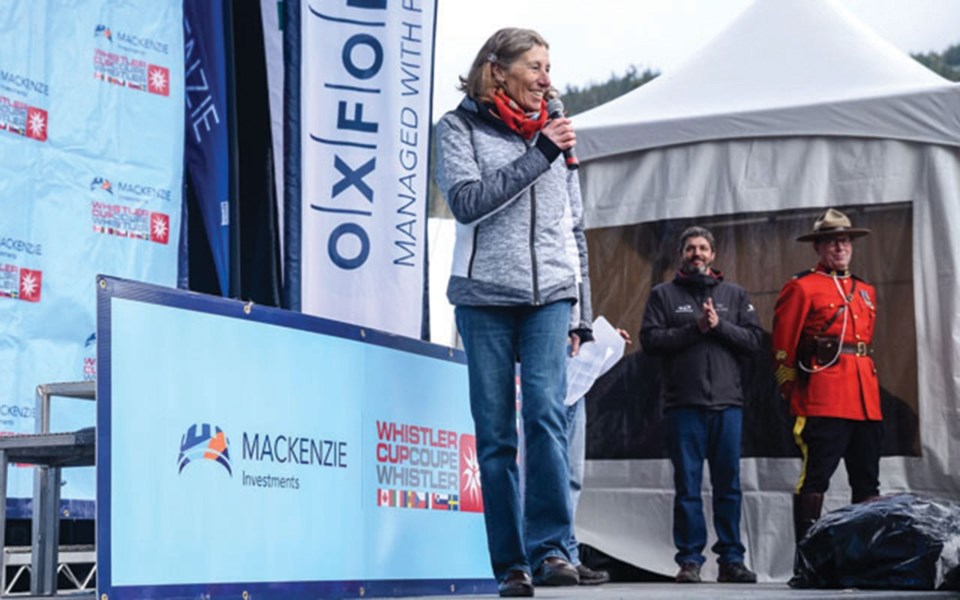
At the council table
Whistler's municipal council was "taken out at the knees" in June by the death of beloved colleague Andrée Janyk, who passed away at the age of 68 after a two-year battle with cancer.
"Andrée didn't just show up, she gave us so much more than that," said Janyk's lifelong friend Colleen Filler, at a July memorial service attended by hundreds. "Through her inspiration, we will be reminded to offer a little more, to dig a little deeper, to make our communities and this world a better place."
But even in mourning, the work must go on.
A municipal byelection was held in October to fill Janyk's seat at the council table, with seven candidates putting their names forward for the position.
In the end, longtime local Cathy Jewett prevailed in a landslide.
"One thing I think that the results speak to is that my campaign's been over 40 years long," Jewett said, shortly after hearing the results on election night.
"I've made so many connections in the community in so many ways, through my volunteer work, through my work on the mountain, and even through my kids and my family connections, so I just want to thank all the people that supported me."
Jewett was officially sworn in at a ceremony on Nov. 7.
Even without the excitement of a byelection, council had a busy year by any measure.
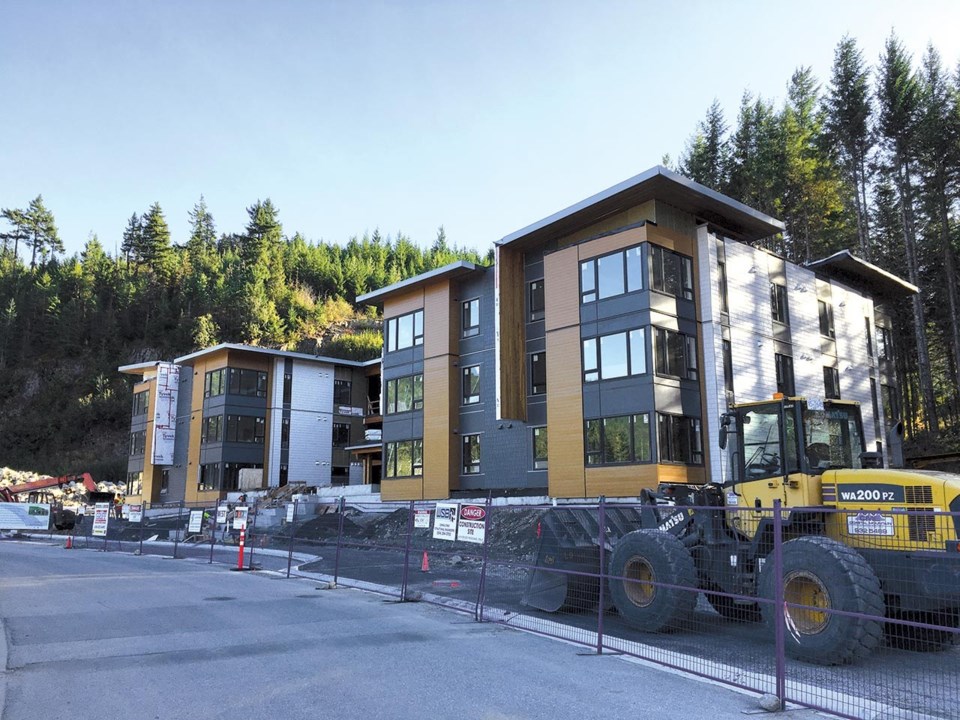
The Mayor's Task Force on Resident Housing, formed in October 2016, carried out a mountain of research before coming forward with seven recommendations at a Nov. 2 community forum.
The aim is to add 1,000 resident-restricted rental beds over five years (an estimate Wilhelm-Morden called "conservative"), and with the task force now wrapped, it all comes down to implementation.
Perhaps the biggest outrage of the year came with the reintroduction of pay parking in Day Lots 4 and 5 — an initiative from the Transportation Advisory Group designed to free up parking spaces and ease congestion.
While the Resort Municipality of Whistler deemed the initiative a success, many in online and public forums were more than a little upset with the move.
There was also the renewal in July of one of Whistler's most divisive events (literally): Ironman Canada will stay in the resort for at least the next three years.
While quite often the loudest voices heard are those expressing disapproval — like in the case of a $3-million artificial turf field approved for Bayly Park in November — there was at least one council decision this year that garnered mostly praise from the community: the decision in March to purchase the 81 hectares of waterfront green space known as the Parkhurst Lands.
What we lost in the fire
According to Pique readers, the biggest news story of the year was the 2017 wildfire season — the worst on record in British Columbia.
More than 45,000 British Columbians were forced from their homes as almost 900,000 hectares of forest burned across the province.
It's no secret that the resort is vulnerable, and council has increased efforts to safeguard Whistler through more fuel thinning and prevention initiatives.
There's also a corridor-wide evacuation plan in the works, should the worst descend on Whistler in future years.
In November, the community had its first Remembrance Day ceremony at the new site of the cenotaph.
The war memorial was moved from its home at the edge of the fire hall's parking lot after a grassroots effort spearheaded by Anne Townley.
"The community truly came together for the project," Townley told Pique before the dedication ceremony on Nov. 10.
"Whenever I asked a tradesperson to join the project there was no hesitation in getting involved. It was very rewarding being involved in such a grassroots project."
More than 1,200 people attended the first ceremony in Whistler Olympic Plaza on Nov. 11.

Crime
By Brandon Barrett
Whistler has long attracted a certain kind of crime typical of resort towns.
Theft of high-end skis, boards and mountain bikes the price of a small car still make up the bulk of the police report on a weekly basis, but it was the more high-profile crimes that made the headlines in Whistler in 2017.
Two of the most troubling violent crimes in resort history wound their way through the courts. A sweeping nation-wide investigation into how police departments treat sexual assault cases led to calls for expanded social services in the Sea to Sky. The Whistler RCMP welcomed a new department head into the fold, and the mysterious disappearance of an Australian woman has left investigators no closer to solving the case as the calendar flipped to the new year.
Pique looked back at all these developments and more from Whistler and around the Sea to Sky in what was a transformational 2017 for both law enforcement and the wider community.
National investigation reveals a quarter of sex assaults reported in Whistler dismissed as unfounded
An exhaustive investigation by the Globe and Mail looking at how Canadian police forces handle allegations of sexual violence found that one in four sexual assaults reported in Whistler are dismissed as unfounded.
The comprehensive, 20-month-long review, the results of which were published Feb. 3, gathered data from 873 police jurisdictions and found that more than 5,000 allegations of sexual assault are closed as unfounded by Canadian law enforcement every year.
Locally, the research showed that 25 of 102 allegations — or roughly 25 per cent — reported to Whistler RCMP between 2010 and 2014 were deemed unfounded by police, higher than the national average of 19 per cent.
In reviewing the respective files, R. Const. and former detachment head Steve LeClair said there was a common pattern in the sexual assault reports from that period. "Typically, it was somebody other than the victim reporting the assault, and then when the police approached the victim, the victim said there was no assault," which would lead to an unfounded classification, he explained. Adding to the challenge of following up on what is already one of the most underreported crimes in Canada is the transient nature of the community, LeClair noted.
"The problem is we have victims and witnesses that aren't local, so if you have somebody from halfway across the world that is a victim in a sex assault, it makes prosecution more problematic," he said.
Police jurisdictions across the country vowed to review their policies after the Globe's sweeping investigation exposed "deep flaws" in how law enforcement treats allegations of sexual violence, from inadequate training to dated interviewing techniques and entrenched rape myths among police.
The BC RCMP's E Division, which comprises the Sea to Sky, also committed to reexamining its policies "to ensure that they are consistently adopted across all of our jurisdictions."
In an interview with Pique following the report, Shannon Cooley Herdman, sexual assault response coordinator at the Howe Sound Women's Centre, pushed for expanded services in the corridor for victims of sexual violence — a call that was echoed by local political and law enforcement officials.
"Certainly, I support expanded access to these forensic (rape test) kits and for services throughout the corridor, and I wouldn't just limit that to Whistler," said West Vancouver-Sea to Sky MLA Jordan Sturdy.
Currently, forensic sexual assault kits are only available in the corridor during business hours at the Squamish General Hospital. Herdman feels the lack of around-the-clock services is a barrier to justice.
"To me, it shows that the smooth path to participating in the (justice) system isn't there and we need to do better," she said.

Concern for nurses' safety mounts following break-in at Pemberton clinic
A break-in at a Pemberton health clinic this February led to calls for increased safety from the BC Nurses Union.
On Feb. 19, police said an "aggressive" 16-year-old male broke into the Pemberton Medical Clinic while a night nurse and patient were inside. The nurse was able to evacuate the patient to a safe room before police arrived.
In the wake of the incident, the union called on Vancouver Coastal Health (VCH) to improve security at the Portage Road facility, which led to several upgrades at the clinic. In spite of those measures, which included a new requirement that overnight nurses work in pairs, the union said nurses "still do not feel safe at the worksite" without an overnight security guard.
In a July presentation to Pemberton officials, VCH chief operating officer Karin Olsen said it makes more sense to add a second nurse in conjunction with additional security measures than to hire a security guard.
"None of the security guards are allowed to touch people... That's why we went with a second nurse. Because the security guards themselves are not able to do any take-downs, they create an extra barrier for the nurses and patients to retreat," she said.
For union VP Christine Sorenson, the decision was unacceptable.
"Nurses are not security guards — nurses are nurses. Violence is not part of a nurse's job," she said.
Whistler RCMP adds drug-recognition expert to the detachment
In its ongoing quest to keep the roads safe, this spring the Whistler RCMP added a drug-recognition expert (DRE) to the force.
Const. Mike Zwicker, 28, is the detachment's newly minted DRE after undergoing specialized training aimed at getting drug-impaired drivers off the road.
Previously, the Whistler RCMP had to rely on a roadside screening device and a field sobriety test to determine if a driver was impaired, only allowing officers to issue a 24-hour driving suspension. It was either that or wait for a DRE to arrive from the Lower Mainland. Now, with an in-house DRE on-call 24-7, Mounties can respond more quickly, and with the full weight of the law behind them.
And with the nationwide legalization of recreational marijuana slated for 2018, police across the country are looking for a leg up on driving enforcement.
"It's a concern for a lot of people, but we are implementing the procedures to effectively deal with this issue," Zwicker said.
Drunk driver who killed 3 in Pemberton crash sentenced to 8 years in prison
Nearly two years after the lives of three men were claimed in a fatal car accident outside of Pemberton, the driver of the vehicle had his day in court.
Lillooet's Samuel Alec, 45, was driving down a steep section of Duffey Lake Road on May 31, 2015, when his vehicle crossed the centre line, striking Whistler cyclists Ross Chafe, 50, and Kelly Blunden, 53, head on. A passenger in the car, 52-year-old Lil'wat Nation member Paul Pierre Jr., was also killed in the crash.
Alec, who pleaded guilty to impaired driving, was sentenced to eight years and four months in jail. The Crown had pushed for 12 years, which would have made it the longest impaired-driving sentence in Canadian history, but the judge ultimately took Alec's troubled past into account when considering his ruling.
"Mr. Alec's childhood was marred by periods of neglect and abuse," Justice William Ehrcke said in his April 28 decision, detailing how Alec suffered physical and sexual abuse from a young age, and began drinking and smoking marijuana at the age of 10.
The court also heard harrowing details from the day of the fatal crash, when an intoxicated Alec tried to leave the scene, urging, "No police, no police," when another driver said he was going to call 911, according to the CBC.
Stewart Blaser, friend to both Blunden and Chafe, who was only a few hundred metres behind the cyclists at the time of the accident, was frustrated with the sentence.
"I know the judge was very thoughtful in his sentencing, but it didn't matter what the sentence was going to be, it wasn't going to satisfy me," he said in an interview at the time with Pique. "The only thing that would really satisfy me is if I knew (Alec) was going to be locked up for the rest of his life... and couldn't hurt any more people."
Whistler RCMP introduces new department head
The Whistler RCMP welcomed a new officer in charge this summer.
On Sept. 5, Staff Sgt. Paul Hayes was officially introduced as the new operations NCO for the Whistler and Pemberton detachments, taking over for longtime department head Steve LeClair, who semi-retired last year after a distinguished 30-year career.
Hayes brings 17 years of policing experience to his new role. He previously worked in Richmond, and served as watch commander in White Rock before being promoted to the Surrey detachment. There, he worked in an administrative role before heading the detachment's media department.
RCMP opens file on missing Whistler man
Local police, in May, opened a missing person's file after a Whistler man had not been seen by friends and family for several weeks. Willy Lynskey, 21, was initially reported missing in April. A student at BCIT at the time, an investigation was quickly launched by Vancouver police, who were able to trace his steps to an Edmonton-bound Greyhound bus on April 12. Investigators confirmed Lynskey checked into the Century Casino and Hotel the following day.
But Vancouver police closed the investigation on April 14, citing privacy laws, after Lynskey's phone pinged a cell tower near Calgary, deeming that it appeared he was trying to distance himself from his family.
Lynskey's family were last in touch with him on April 1, and still have received no word from their son. His social media and banking accounts have remained inactive, and local police are no closer to tracking him down months after his file was first opened.
"We can't say if he's in Edmonton, Calgary or if he's back in British Columbia, so we are looking for an appeal of help for anybody who has information they can share about Mr. Lynskey and his whereabouts since April of this year," said Staff Sgt. Paul Hayes with the Whistler RCMP.
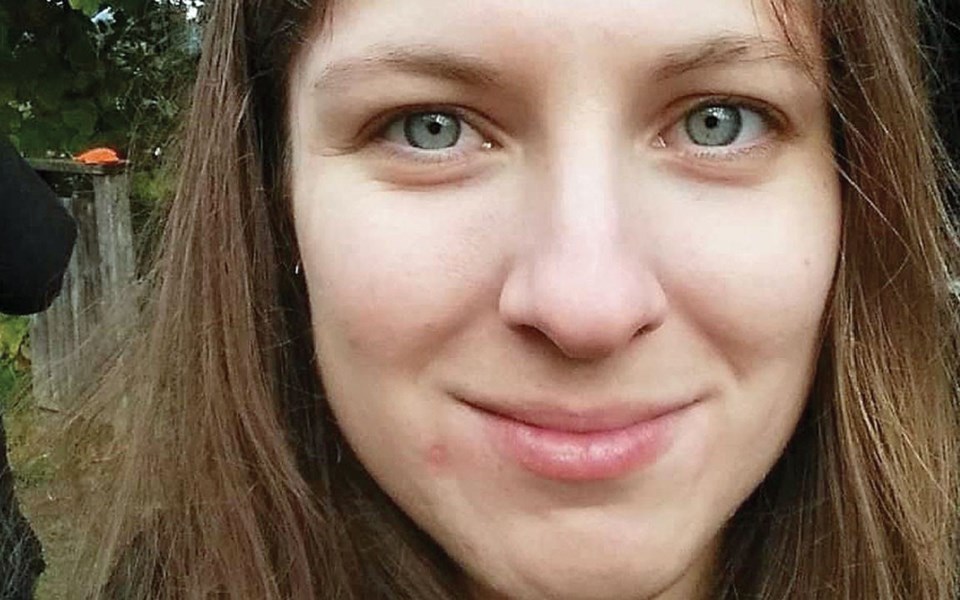
Still no sign of missing Aussie woman
The strange case of an Australian woman who vanished from the resort in late November has offered more questions than answers to a frustrated public.
Alison Raspa, 25, was last spotted leaving the Three Below Restaurant in the village in the early hours of Nov. 23.
Despite later finding Raspa's cell phone in Alpha Lake Park, as well as her backpack, jacket and wallet at a nearby Creekside intersection, investigators remain unsure of her whereabouts.
"We do not know where Ms. Raspa is; however, due to the close proximity to the lake where some of her personal belongings were found, we will continue to consider the lake as a possibility," said Staff Sgt. Paul Hayes in an email last month. Investigators do not believe foul play is a factor at this point.
With no significant leads, police decided to suspend the ground search for Raspa nearly two weeks after she was reported missing.
So far, dive teams from the RCMP and local fire department have conducted five underwater searches of Alpha Lake to go along with two ground searches organized by the public.
The file will remain open until Raspa is found, and "all investigational avenues and tips will continue to be looked at," Hayes said.
Arvin Golic sentenced to prison for his role in Whistler stabbing death
The latest chapter in one of the most violent incidents in Whistler's history came to a close in December when Arvin Golic was sentenced to seven years in prison for his role in a 2015 stabbing in the village.
On May 17, 2015, 19-year-old Luka Gordic was visiting Whistler when he was swarmed and stabbed by a group of teens as he was leaving the Marketplace 7-Eleven. One of the attackers was Arvin Golic, 18 at the time, who was convicted of manslaughter in June.
Three young men, who were 17 at the time of the attack, were convicted in B.C. Supreme Court in October. Two of the teens were convicted of manslaughter, while a third was convicted of second-degree murder. The teens cannot be named as they were minors at the time of the crime.
Prosecutors originally pushed for a nine-year sentence, while Golic's attorney called for four years due to his client's supposedly "limited role" in the incident.
The Gordic family has maintained its belief that their son was attacked for criticizing the way one of Golic's friends had treated a woman while in Whistler, which they believe should have warranted a second-degree murder charge. But a judge, in June, said the Crown had failed to prove Golic planned to kill the Burnaby teen.
Golic's sentencing was postponed in September after evidence came to light that he had intimidated a Crown witness, his ex-girlfriend.
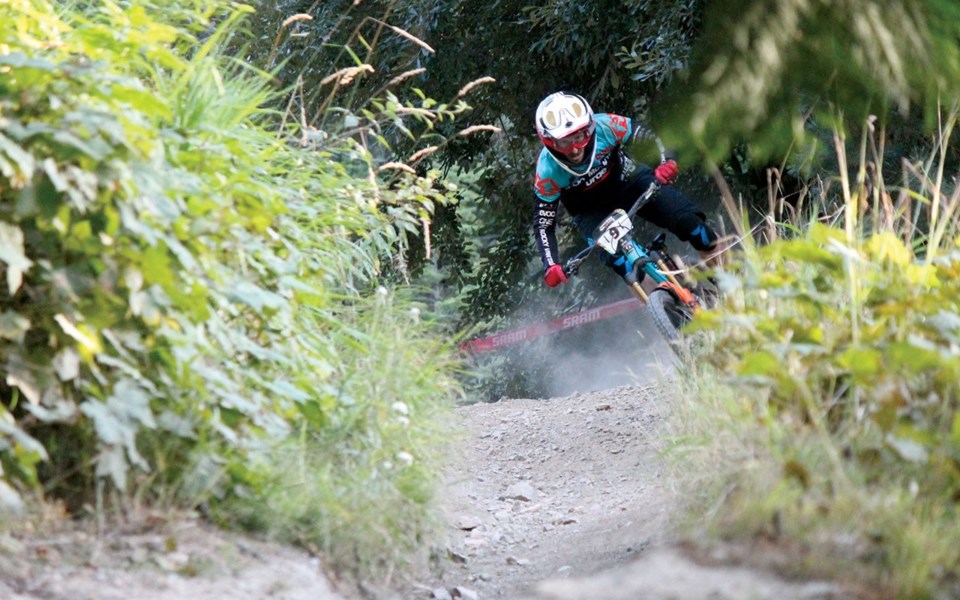
Sports
By Dan Falloon
With the 2018 Winter Olympic Games set to start in just over a month, several athletes approached 2017 with the goal of wearing the maple leaf in PyeongChang, South Korea come February.
A number of those winter athletes excelled, bringing home medals and boosting their chances of heading eastward.
Here's a rundown of how Whistler's best fared over the past 12 months.
Marielle Thompson
The 2016-17 campaign resulted in a rise back to the top for the 25-year-old skier.
Thompson scored seven wins, including in her last three competitions, on the FIS World Cup ski-cross circuit as she claimed her third Crystal Globe to go with those she won after the 2011-12 and 2013-14 seasons.
The accolades continued in December as she and Whistler paralympic skier Josh Dueck were announced as the newest inductees into the B.C. Sports Hall of Fame for 2018.
However, the defending Olympic champion likely won't get a chance to repeat this February at the 2018 Olympic Winter Games in PyeongChang, as she ruptured both her anterior cruciate ligament and her medial collateral ligament during an October crash on a training run in Switzerland,

Teal Harle
The young slopestyle up-and-comer picked up his first-ever FIS World Cup win in Silvaplana, Switzerland on March 3. Just 20 at the time, Harle scored a 92.80 to best Americans McRae Williams and Gus Kenworthy.
Harle hit the top 10 on one other occasion, earning a fourth place in big air in Quebec City in February, finishing just off the podium.
Reid Watts
The 19-year-old luger's Christmas wish came early in 2017 as he qualified for his first-ever Olympic Games.
Watts is headed to the Games this February after finishing 34th overall on the World Cup circuit in 2016-17, and setting a new personal best on the World Cup in December with a 17th-place finish in Calgary.
Manny Osborne-Paradis
With the Olympics looming, the Alpine Canada veteran speedster had a consistent 2017, hitting the top 20 in all but four of his 16 starts — with five top-10 appearances.
The Whistler Mountain Ski Club (WSMC) alumnus didn't take home any hardware this season, though, as he took fourth-place finishes in downhill races in Kvitfjell, Norway and Aspen, Colorado, as well as fifth in a different downhill at Kvitfjell.
Rhegan Williamson
The Whistler Freeride Club continued to make its presence known at the Freeride Junior World Championships in Andorra in February.
Local ripper Williamson hit the podium, taking third in the women's ski event on a blustery day in Europe.
A pair of other locals performed admirably on the men's side, as Cooper Bathgate scored an eighth-place finish and Luke Lister, a late addition to the active roster after being upgraded from an alternate, placed 11th.
Finn Iles
Whistler's perennial favourite young gun will be officially going up against the pro men beginning in 2018.
But the dominant downhiller should be able to hold his own out of the gate as he blazed through his final season as a junior, wrapping up the overall title in early July with finish times that challenged, and even surpassed, some of the sport's biggest names.
The lone smudge on his record this year was at the World Championships in Cairns, Australia, where he crashed twice en route to a 10th-place finish.
Jesse Melamed
At last!
After knocking on the door of the Enduro World Series' top step in recent years, including a second-place finish at the Canadian Open Enduro in 2016, the homegrown superstar broke through at the same hometown race in 2017.
The 25-year-old outlasted eventual series winner Sam Hill in a back-and-forth contest that saw him win three of the five stages, still managing to hang on after a crash in the final stanza.
Overall, Melamed hit the top 10 in his final four events of the season and finished 12th overall in the standings, recovering after a slow start to the season.
He also completed his first BC Bike Race, taking ninth after the week-long stage race.
Brandon Semenuk
Already a slopestyle legend at just 26, Semenuk further cemented his legacy with a fifth win at the Red Bull Joyride.
In 2017, Semenuk was the wire-to-wire winner, being the first to drop in the first run and the last to come in during the second.
Joyride was one of only two Freeride Mountain Bike events that Semenuk did this year as he continues to pursue rally racing as well.

Cassie Sharpe
It's been an incredible 2017 for the halfpipe skier.
The Whistler resident, by way of Comox, picked up three victories in 2017, earning FIS World Cup triumphs in Tignes, France and Cardrona, New Zealand before topping the superpipe competition at the Dew Tour in Breckenridge in December.
The 25-year-old also finished at least ninth in all five World Cup events she completed this season.
Chris Spring
Spring, a Canadian bobsledder who rose the ranks with the Whistler Sliding Centre as his home track, enjoyed a massive 2017.
The 33-year-old has only missed the top 10 twice in 10 races so far in the 2017-18 season, and in the two-man, he took a win in Whistler in November and a second in Winterberg, Germany, while also piloting a four-man sled to third in Park City, Utah.
It's been a turnaround after a tough second half of the 2016-17 season where Spring hit the top 10 only twice in 10 races.
Jane Channell
The Whistler Sliding Centre's homegrown skeleton athlete out of North Vancouver hit the top 10 in nearly half of her World Cup events in 2017, scoring single digits in five of her 11 races.
That was headlined by a second-place finish here in Whistler in November when she was second to only Germany's Jacqueline Loelling. The 29-year-old also scored three sixth-place finishes over the course of the year as she eyes her first Olympics.
Luke Smart
The local freestyler had a year to remember as he captured the overall junior freestyle title on home snow in April.
The BC Team athlete, competing in the U18 division, won the men's crown on the strength of a win in the slopestyle and second in the big air. (Whistler's Skye Clarke finished third among the women.)
He also won the season-opening slopestyle event on the Canadian Open Tour in Yukon at the end of November to kick off 2017-18 right.
Stefanie Fleckenstein
The Whistler Mountain Ski Club's top female alumnus had a solid 2017, including attending her second FIS Junior World Ski Championships in Sweden.
The 20-year-old hit the top 20 with a 14th-place showing in Alpine combined while also representing Canada at a World Cup stop for the second time, racing in Lake Louise, Alta. for the second year in a row.
At worlds, she also helped Canada to gold in the team event alongside WMSC teammate Jack Crawford.
Simon d'Artois
Whistler's homegrown halfpiper should be on track to head to the Games after earning medals in his first two World Cup appearances this season.
The 25-year-old was third in both Cardrona, New Zealand and Copper Mountain, Colo., and finished no lower than 10th in any of the five World Cup events he completed in 2017.
Logan Pehota
The Pemberton skier's second year on the Freeride World Tour wasn't quite as magical as his first, when he finished second overall, but it was still solid.
The highlight was a second-place finish in Fieberbrunn, Austria to help him qualify for the prestigious tour stop in Haines, Alaska, where he claimed victory in his first season.
Whistler is a smorgasbord for sports lovers and this rundown is by no means an all-encompassing list of each and every accomplishment by local stars. Here's to many more medals and stories to tell in 2018!

Arts & Culture
By Cathryn Atkinson
Whistler continues to yield big stories in arts, entertainment and culture, with its desire to embrace cultural tourism looking, these days, more like a bear hug. As the resort comes into its own as a four-season destination, arts and culture has grown far beyond merely augmenting the outdoor sports and recreational offerings here — to having a life of its own.
Here are some of the biggest news items from Whistler's creative realm over the past year.
January
In late January, municipal staffer John Rae was appointed to the new position of manager of cultural planning and development, a position created by the Resort Municipality of Whistler (RMOW) following the retirement of community cultural officer Anne Popma.
Formerly the resort's part-time manager of strategic alliances, Rae said in an interview in May that the RMOW wanted the position to support cultural tourism as Whistler diversifies its offerings to millions of visitors.
Rae added that the RMOW was exploring the idea of seeking UNESCO World Heritage Site status for Whistler. Other plans include an artist-in-residence and a biologist-in-residence to support Whistler's wilderness culture.

Meanwhile, Israeli photographer Guy Fattal was crowned King of Storms at the 2017 Deep Winter photo competition in his second attempt at the crown.
Whistler Pride and Ski Festival, the resort's annual LGBTQ celebration, turned 25, with dozens of events and entertainers, such as the Cube Guys and Pam Ann.
February
The Audain Art Museum continued to cement its position as one of B.C.'s premier cultural institutions with the opening of Matisse Drawings, a collection of still-lifes and portraits by French master Henri Matisse.
Also, the organizers behind the Whistler Chamber Music Society announced a series of performances by visiting chamber groups throughout 2017, after the success of previous concerts spurred interest for similar programming locally.
March
On March 8, Dusty's Bar & Grill hosted the third annual Raising Our Voices night, with around 30 Whistler women singing and performing to raise money for the Howe Sound Women's Centre and the Whistler Women's Centre, and their services for women escaping violence. Over $10,000 was raised to mark International Women's Day.
Later that month, the resort's largest cultural organization, Arts Whistler, announced it was the recipient of three BC Arts Council grants totalling $30,390.
April
The World Ski and Snowboard Festival returned for its 22nd year with State of the Art, Multiplicity, the Olympus 72hr Filmmaker Showdown, Olympus Pro Photographer Showdown, and free concerts with Walk Off the Earth, Keys N Krates and more.
This was the final year for organizer Sue Eckersley and Watermark Communications, though at a December luncheon hosted by the Whistler Chamber of Commerce, WB's chief operating officer Pete Sonntag confirmed that WSSF will be back in 2018.
May
One of the biggest music stories of 2017, both in Canada and beyond, broke on May 18 when the Pemberton Music Festival (PMF) declared bankruptcy and abruptly shut down operations after four years, just weeks after naming its lineup for the July event.
Following the announcement, New Orleans-based organizer Huka Entertainment claimed the decision to cancel the festival was made by a separate entity, Pemberton Music Festival, LP (PMFLP), comprised mainly of local investors. But earlier business filings told a different story.
Up until a month before declaring bankruptcy, company registries showed that Twisted Tree Circus GP, which was headed by two of Huka's top executives, controlled PMFLP. On April 19, Twisted Tree Circus was replaced as general partner of PMFLP by another corporate entity, 1115666. Within a month, both PMFLP and 1115666 had declared bankruptcy, timing that puzzled some legal observers. "It's odd that you'd switch general partners a month before your bankruptcy," Vancouver bankruptcy lawyer Geoffrey H. Dabbs told the Vancouver Sun.
Tickets had gone on sale for 2017 prior to the bankruptcy filing, with refunds slow for the thousands who had already purchased tickets, and those without credit card insurance unlikely to receive refunds.
Bankruptcy proceedings continued with Ernst & Young (EY) being named trustee in the case, and later releasing a list of 130 secured and unsecured creditors. Altogether, unsecured creditors were owed over $13.1 million, with some individual companies and service providers out tens of thousands of dollars.
At a creditor's meeting on June 6 in Vancouver, EY presented a report that stated that the festival lost money in every year of its operation — 2014, 2015 and 2016. The 2014 Pemberton Music Festival lost $16.9 million, which was funded in its entirety by Canadian investors. In 2015, the festival lost $16.8 million, with investors questioning their losses and further involvement with Pemberton. They were placated by Huka promising increased ticket sales leading to breaking even. But in 2016, the festival incurred another operating loss of $14 million.
Huka called the EY report "outrageous," issuing its own Statement of Facts, describing its own actions as "conservative and guarded in its financial projections."
The resolution process was put on hold after PMF ticket provider Ticketfly went to court with a constructive trust claim in an attempt to recoup money they had lost in sending Huka money they had taken in 2017 ticket sales.
Later that month, Arts Whistler held its AGM following a year of major change at the organization. Between its new website, branding, executive director Maureen Douglas, and increased funding from the federal government in the form of a $489,500 grant from Heritage Canada, it was a hopeful outlook on the future of arts and culture in the resort.
June
Whistler honoured one of its own in June with the Chili Thom Experience. Remembering the talent of the beloved late artist, the exhibit featured paintings pulled together from his decade-spanning creative career spread across five different local venues.
Thom was also remembered in May with a special lifetime achievement award at the Whistler Excellence Awards.
The 40-year-old tragically passed away in November 2016 after a long battle with cancer. Along with his contributions to the resort's cultural landscape through his paintings and films, he was also heavily involved with Arts Whistler and other local arts organizations.
July
Canada 150 celebrations on July 1 were a hit, with the return of the Vancouver Symphony Orchestra (VSO) to Whistler, along with other celebrations. In all, the VSO and the Vancouver Symphony Orchestral Institute at Whistler (VSOIW) performed 10 concerts during the week. The VSOIW brought 90 students from all over the world to Whistler for its third year.
Also in July, author Caroline Adderson was named as Whistler's writer-in-residence for 2017, running programs in the run-up to the Whistler Writers Festival.
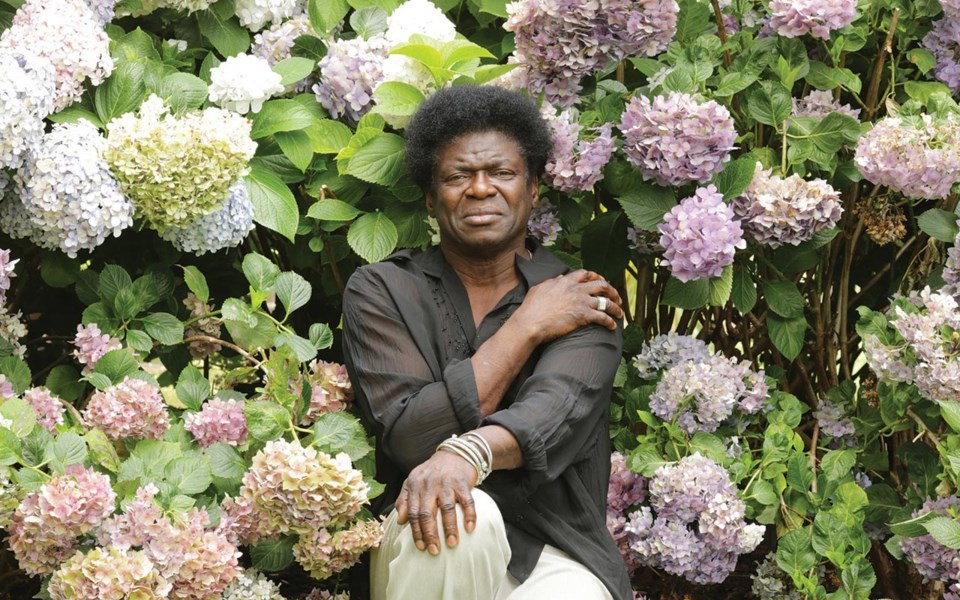
August
There was a packed, unforgettable free performance by American soul singer Charles Bradley on Aug. 5 as part of Wanderlust Whistler, just weeks before the 68-year-old passed away from stomach and liver cancer.
Over at the world's largest mountain bike festival, Crankworx, two events for sports-action buffs went off to packed crowds. Dirt Diaries on Aug. 15 saw filmmakers Micayla Gatto and Matt Dennison take home the title, while the always hotly contested Deep Summer Photo Challenge crowned Swedish photographer Daniel Ronnback on Aug. 17.
September
BC Culture Days was officially launched at the Audain Art Museum on Sept. 28, and became a resort-wide community event with the organizational support of Arts Whistler and other arts stakeholders.
October
The Whistler Writers Festival returned with authors Doug Saunders, Frances Itani, Lee Maracle and Terry Fallis and the 2017 Scotiabank Giller Prize winner Michael Redhill headlining.
Chris Prior, owner of Prior Snowboards & Skis and a major supporter of Whistler artists through his annual Topsheet Competition, passed away at home on Oct. 15.
Whistler-based Australian singer-songwriter Vendulka won the 2017 Whistler Music Search at the Crystal Lounge in the final on Oct. 26, after a month that saw performers showcasing their best performances of original and cover tunes.
November
Suzanne Greening, the inaugural executive director of the Audain Art Gallery, chose to leave the museum in November after the Audain's board of trustees informed her they would not be renewing her contract when it came up for renewal in March 2018. Her replacement had not been named at press time.
The same month, the Audain announced it had received a $2-million donation for its permanent endowment fund from president of Vancouver's G.I.H. Properties, Tom Gautreau, and his wife Teresa.
December
The Whistler Film Festival returned for its 17th year with the screening of 87 films, and a slew of industry programming for emerging Canadian filmmakers.
Attending the 2017 festival were honourees and acclaimed actors Bill Pullman and Kyra Sedgwick, who each brought films to the event. Judges were split on the Borsos Award for Best Canadian Feature, voting to honour two films: Ian Lagarde's experimental All You Can Eat Buddha and Carlos Sanchez's arresting thriller, Allure.
The Audain Art Museum made the news once more in December after acquiring a rare Emily Carr painting, Le Paysage, for $1 million. The painting was purchased for the museum from a private collector and paid for by the Audains' family foundation.
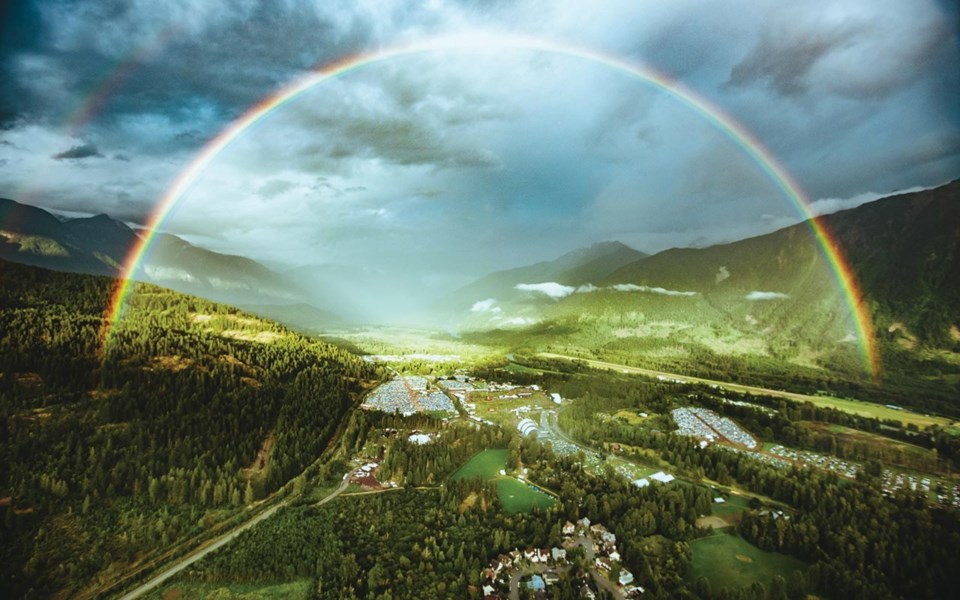
Pemberton
By Joel Barde
Pemberton continues to attract dynamic newcomers looking to open businesses and get a foot in the housing market.
And like any growing community — its southerly resort neighbour included — it is dealing with a number of pressures, from a shortage of long-term housing, to a lack of adequate transit to ferry people around, to the impact on the natural environment.
Trash troubles
The backcountry around Pemberton continued to see more visitors in 2017, and many, it seemed, didn't know the first thing about proper backcountry etiquette.
In June, two hikers hauled over 18 kilograms of trash from Joffre Lakes Provincial Park. Their social media posts went viral, garnering media attention and thousands of likes.
Capitalizing on the attention, Whistler retail outlet Escape Route ran a social media contest in which people hauled garbage out of the backcountry and posted a photo of it with the hash tag #packitout150.
The increased traffic and garbage also led to the Canadian Parks and Wilderness Society (CPAWS) to call for more park rangers for the province.
"It's very important to spread the message right now," said CPAWS ambassador Heather Filyk in July, after a trip to Joffre Lakes in which she saw a guy tear down a tree in order to make a fire.
Village of Pemberton (VOP) mayor Mike Richman agreed that the garbage issue is problematic. "There's been increased volume in our area," he said. "And we want to make sure our backcountry and our towns and lakes are all protected."
Richman said he's met with members of B.C.'s new NDP government about getting more staff in the park. "The message has been loud and clear that we need some more support on this," he said.
"We've spent a lot of money marketing our province — and that's great for business. But it's also come with some impacts."

Ironman: No thanks, we're good
In a move that put the Village of Pemberton (VOP) at odds with the Resort Municipality of Whistler (RMOW), officials voted not to support the renewal of the Ironman race in Spud Valley.
The decision came after heated social media discussion and a survey that indicated area residents opposed the race route. Much of the resentment came from the race's impact on local business — it effectively shuts down the highway southbound for much of race day — and how it prohibited access to Pemberton Meadows Road. Area residents also complained about athletes who behaved disrespectfully in the lead-up to the event, claiming training cyclists sometimes rode three abreast and showed indifference to locals' and their properties.
"You should see how many times I get the finger driving the tractor up and down that road trying to get from hayfield to hayfield, (or) the number of people that swear at me when I pass them with my tractor," said Pemberton Meadows resident Dudley Kennett.
"These bikers are competitive, they're focused on their thing and they're totally oblivious to the fact that they're doing this in somebody's backyard."
Transit loss: Hard for the worker bee
Pembertonians lost some significant transportation options in 2017, making it difficult for late-night workers to make it home from the resort.
In November, Greyhound Canada announced it would be reducing its Pemberton-Whistler schedule due to low ridership and competition from other providers. It also laid out plans to discontinue its only daily trip to Mount Currie.
"Greyhound's been operating at a deficit since 2004, so along these corridors, this is not a situation of mismanagement but a situation of an actual decline in ridership," said Greyhound's Western Canada VP Peter Hamel in a September interview with Pique.
Under the current schedule, there are three trips from Whistler to Pemberton, the last bus departing from the village at 5:15 p.m., which is particularly challenging for Pembertonians who work late hours in the resort.
Richman acknowledged the burden the cuts have placed on the community.
"There are a lot of people that work service industry jobs and (the available services) just don't accommodate them," he said.
"We're going to start with a few short-term solutions — that hopefully won't cost too much — but we need to work towards the bigger picture. We're going to use 2018 to try to understand how we can improve local transit."
Relief could be on the way in the form of two additional daily Whistler-Pemberton trips recently proposed by BC Transit — but they aren't expected to be implemented until 2019 after a governance and funding model can be cemented with local governments.
Pemby Fest axed, and Pemberton businesses feel the loss
In May, U.S.-based Huka Entertainment rocked the valley with its announcement that the Pemberton Music Festival was going under. Roughly 18,000 people had already purchased tickets to watch headliners like Chance the Rapper, Muse and A Tribe Called Quest at the July event.
For Richman, the loss of the three-day event represents a major blow to the community. "There's certainly some sadness there. To watch the transformation of our town for over a week was pretty incredible," he explained.
"On the other hand, this year we had some major forest fires around the province. And not having 40,000 people in the valley was a bit of a relief, given the summer we had," he said.
The loss has been a major hit to the area, given that the festival is thought to have injected over $200 million into the local economy over its three years.
"The economic loss is huge: you know, the lead-up to the event, the teardown of the event, it brought so much activity to the area. Those things on their own had a ton of spinoffs," said Richman.
Across the village at Grimm's Deli, owner Mark Mendonca felt the impact on a personal level, having invested in equipment to cater the event. In a Pique feature on the cancellation, Mendonca explained that he now has a portable restaurant set-up but no large-scale event to use it at.
"We were looking at it as a long-term investment," he said.
Richman, however, believes that Pemberton will get a new festival in the future. He said he's already had "a couple conversations" with interested parties.
"We've proved we're great hosts. Will (a festival) look the same? Will there be 40,00 people? Probably not, but I think there will be a new festival of some sort that will emerge," he said.
Reining in short-term rentals
Pemberton officials continued to wrestle with the proliferation of short-term vacation rentals in 2017.
On July 18, the VOP hosted a forum at the Pemberton Community Centre that aimed to inform the community of some of the regulatory options available.
According to David MacKenzie, Owner of the Pemberton Valley Lodge and president of the BC Hotel Association, short-term rentals are eating up long-term housing stock, leading to staffing issues for local business, and benefit from an unfair competitive advantage, as they don't pay hotel taxes.
Speaking at the July 18 meeting, Mackenzie said that four houses in his cul-de-sac operate Airbnbs, causing issues with parking and a steady stream of visitors. Pemberton used to be Whistler's bedroom community, he said, but long-term accommodation has dried up, tearing at the "fabric of our community."
In September, council heard several options for regulation options in a VOP report. Staff recommended taking a "blended" approach, beginning with developing a clear definition of what actually constitutes a short-term vacation rental.
Council ultimately directed staff to implement the regulations in a new draft-zoning bylaw that would permit short-term rentals under certain conditions at a Sept., 12 council meeting.
Under the proposal, operators would need a business licence to host a short-term rental, and, if approved, the VOP would limit the number of permits issued each year to control the impact on residential neighbourhoods.
"This is our first crack at it. It's something we're just learning about," Richman said.
"I think we've put a good start to it, and now we'll see how it works.... I'm sure we will definitely be revisiting it."



